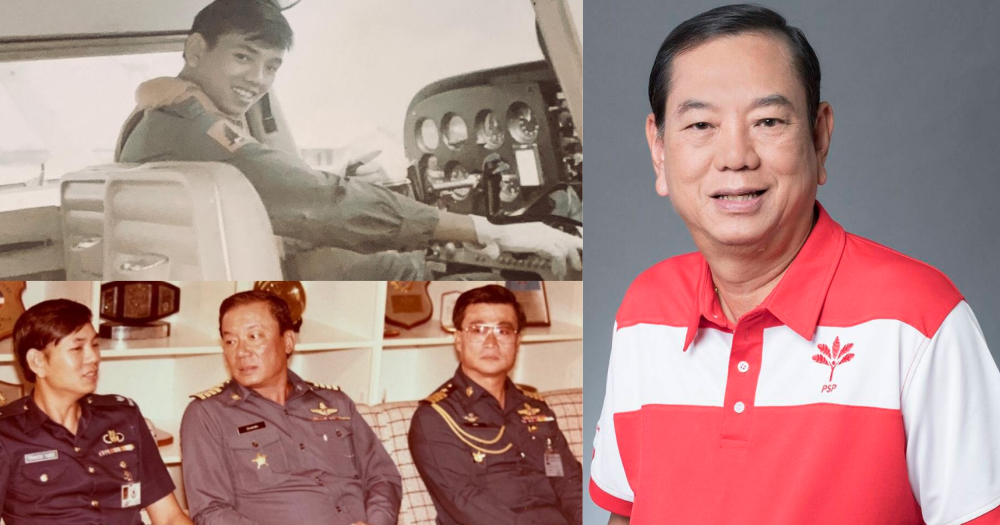On Thursday morning, the Progress Singapore Party (PSP) unveiled its first slate of six candidates to the public in a virtual press conference.
The group is made of businesspeople, entrepreneurs and accountants, with the youngest being a 40-year-old IT professional.
Among these, the most recognisable, of course, are former National Solidarity Party Secretary-General Hazel Poa and the vocal Brad Bowyer, who was earlier this year the first individual against whom POFMA was invoked.
A man with the resume of a PAP candidate
But leading the charge with the most impressive-looking resume is in fact the oldest among the group: 70-year-old Francis Yuen Kin Pheng, a former Air Force Lieutenant Colonel.
He has a storied career in the field of aerospace engineering locally and in China, where he spent 14 years in Beijing and Shanghai growing their aerospace industries through the multinational corporations he was a part of.
A Singapore Armed Forces (SAF) scholar, he also worked with the likes of Ministers Teo Chee Hean, George Yeo, Lim Hng Kiang, and Lim Swee Say in his two decades serving in the ranks of the Air Force leadership.
Sounds a whole lot like the pathway of a ruling party candidate, a potential political office-holder, even, no?
Yuen acknowledges this, saying he gets that a lot.
He's talking to us on a Wednesday afternoon over a Zoom call from his home, hair slicked neatly back and dressed in a loose patterned shirt in the traditional way you'd expect someone of his age and stature to be maintained even without receiving any visitors or any place to go.
Like other "retirees" of esteem (who have been many places, accomplished many things, and know people in high places in their decades of work), the use of the term in inverted commas is necessary for Yuen as he continues to be kept busy in advisory roles on projects here and in China, as well as with multiple other companies.
But yet, we definitely admit to finding ourselves coming into conversation with Yuen with great curiosity on two overarching questions:
- Why enter politics now?
- Why the PSP, and why stick with it?
As it turns out, intriguingly, some of the answers can be traced from the story of his life.
Lost both parents within months of each other during O-Level year
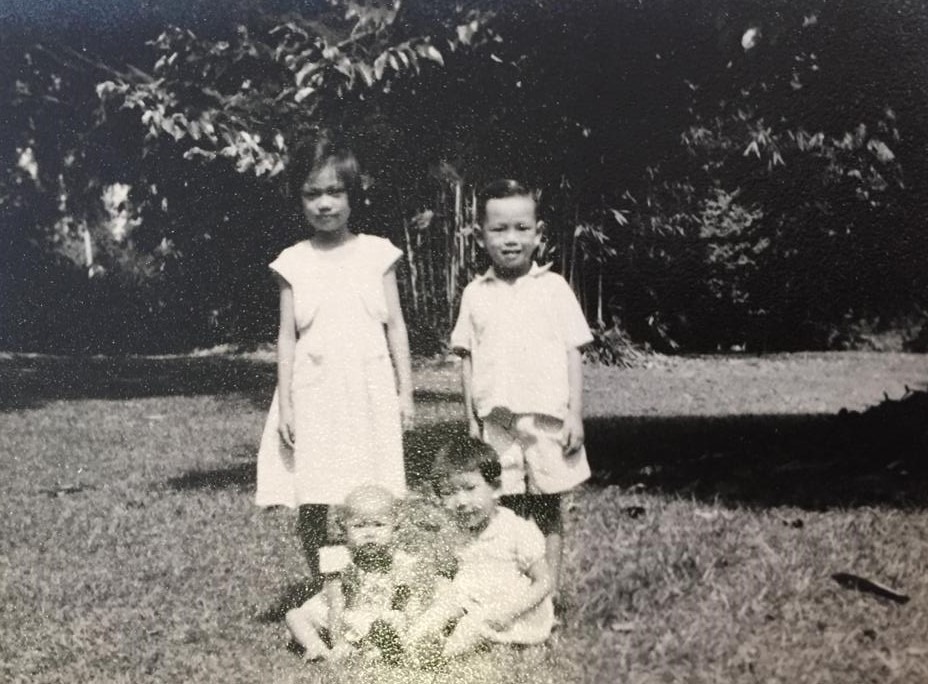 Yuen and three of his siblings. Photo courtesy of Francis Yuen Kin Pheng
Yuen and three of his siblings. Photo courtesy of Francis Yuen Kin Pheng
The eldest son of eight siblings, Yuen felt the need from a young age to be mature and set an example for his four younger sisters and two brothers — he has one older sister.
Growing up in the dingy streets of Chinatown, a teenaged Yuen would witness knife fights between gangsters and ride a bicycle to Keong Saik Street to invite his father's friends to their home to play mahjong in the evenings.
He says his restless entrepreneurial spirit comes from his father and grandfather, who ran multiple different businesses, and he would sell cigarettes he would buy in cartons to the mahjong players his dad entertained for some pocket money.
He worked hard in school, although he calls himself a late bloomer studies-wise, "only" managing to score straight As on his A-Level exams, and not doing as well at his O-Levels.
He would go on to place top in his classes at university and the postgraduate courses he would go on to be sent to, and win multiple prestigious academic awards too.
But a way more compelling reason for him to grow up quicker than his age was undoubtedly the loss of his parents to cancer within months of each other the year he was doing his O-Levels — his mother died from cervical cancer, while his father from a blood cancer.
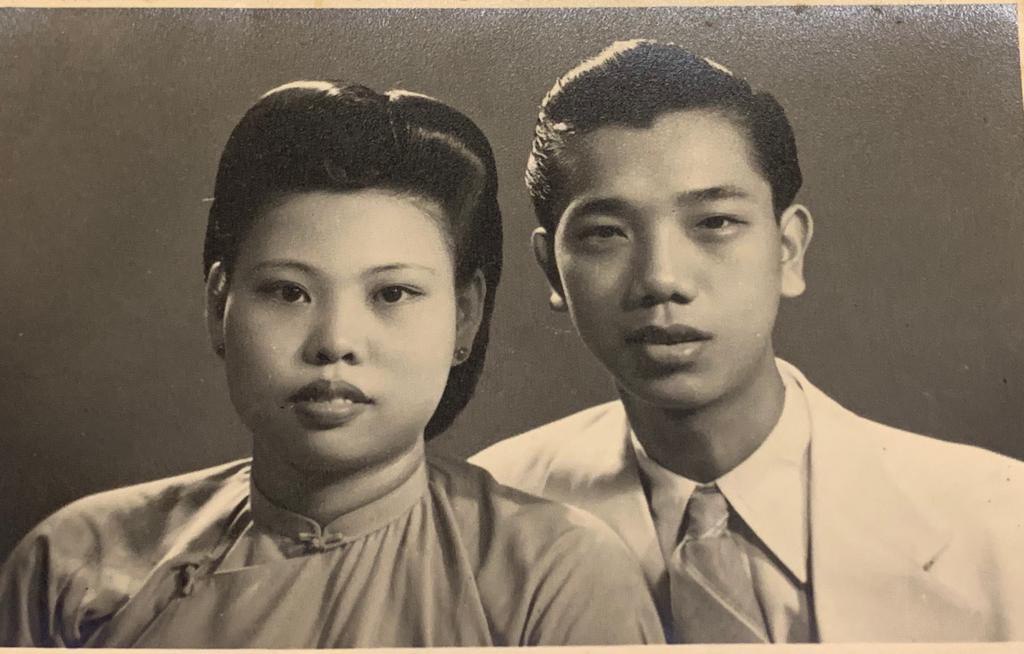 Yuen's late parents who passed away when he was around 16 years old. Photo courtesy of Francis Yuen Kin Pheng.
Yuen's late parents who passed away when he was around 16 years old. Photo courtesy of Francis Yuen Kin Pheng.
He said it was a "very difficult" time that he only got through thanks to his steely uncle and aunt, who immediately moved him and his siblings to their shophouse on Smith Street, reminding him of the importance of focusing on his studies.
"All these experiences from my childhood and growing up years gave me the values that I brought into my adulthood — caring for people, and making sure nobody gets left behind."
The Air Force years
Enamoured by the glamour and prestige of flying, Yuen signed on to the Republic of Singapore Air Force (RSAF) right after his A-Levels.
His first step out of Singapore wasn't to Malaysia, but to various parts of France over a year for helicopter assembly and flying training, among a pioneer batch of six engineers and four pilots plunging into a land where courses and conversations were conducted purely in French.
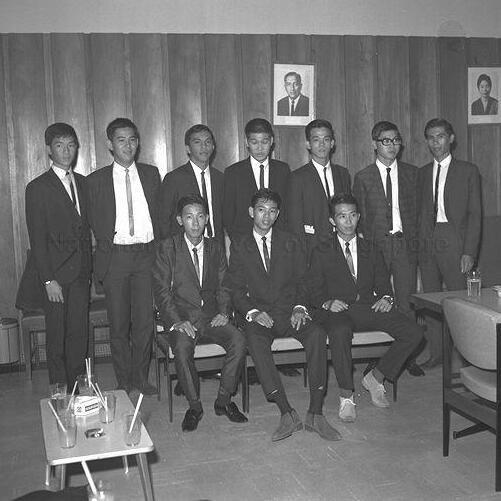 Yuen and his fellow trainees in France in the late 1960s. Photo courtesy of Francis Yuen Kin Pheng.
Yuen and his fellow trainees in France in the late 1960s. Photo courtesy of Francis Yuen Kin Pheng.
He would eventually go on to assemble the RSAF's first-ever helicopter with the 120 Squadron, and also got the chance to learn to fly planes — starting with the Cessna 172 aircraft.
 Yuen's first flying experience on the Cessna 172 light aircraft. Photo courtesy of Francis Yuen Kin Pheng.
Yuen's first flying experience on the Cessna 172 light aircraft. Photo courtesy of Francis Yuen Kin Pheng.
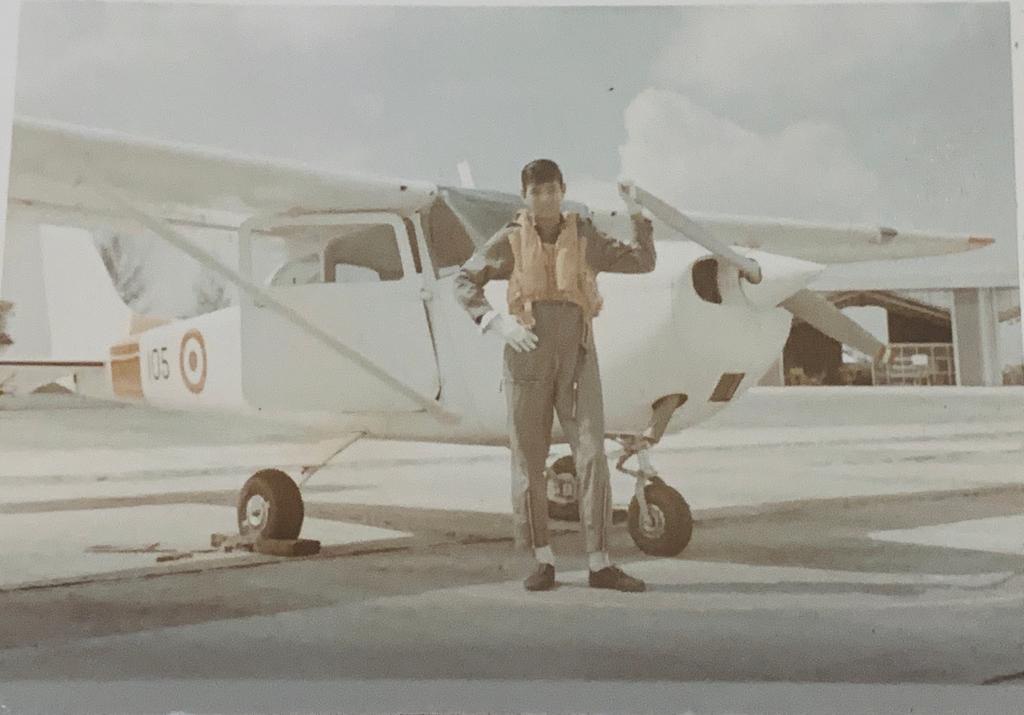 Photo courtesy of Francis Yuen Kin Pheng.
Photo courtesy of Francis Yuen Kin Pheng.
He counts it as a "blessing in disguise" that his 200 hours of flight training eventually didn't result in him graduating as a full-fledged military pilot, because after a training stint in the UK, he returned and was selected as a scholar, and as a young married man and new father at age 24, Yuen went through his Bachelor degree programme in business administration, graduating at the same time as his first daughter from kindergarten.
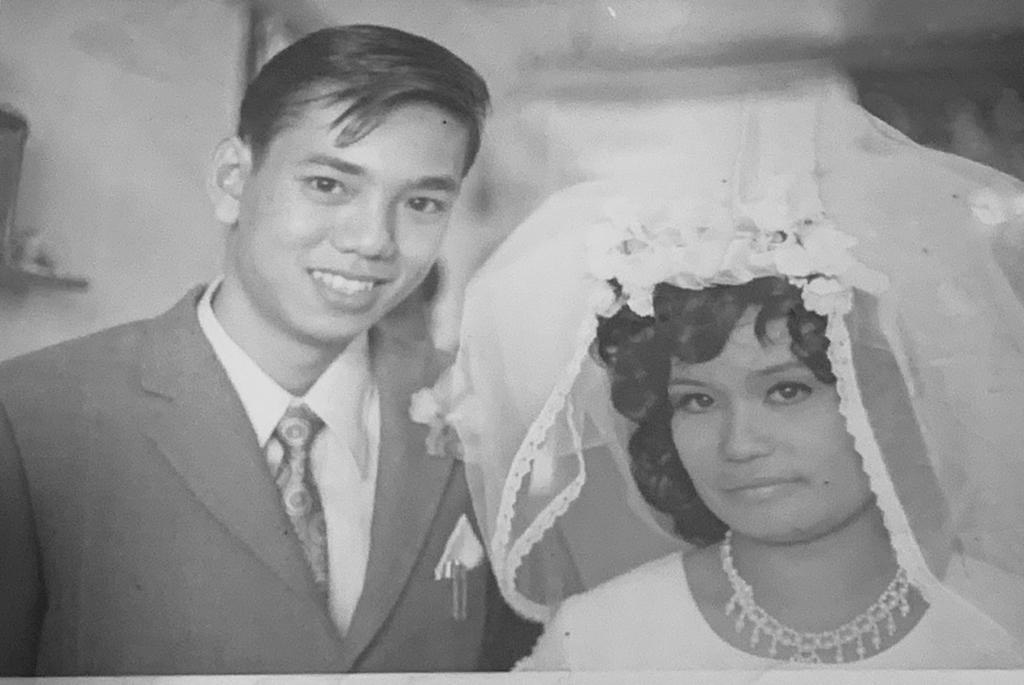 Yuen and his wife, Penny, at their wedding in 1974. Photo courtesy of Francis Yuen Kin Pheng.
Yuen and his wife, Penny, at their wedding in 1974. Photo courtesy of Francis Yuen Kin Pheng.
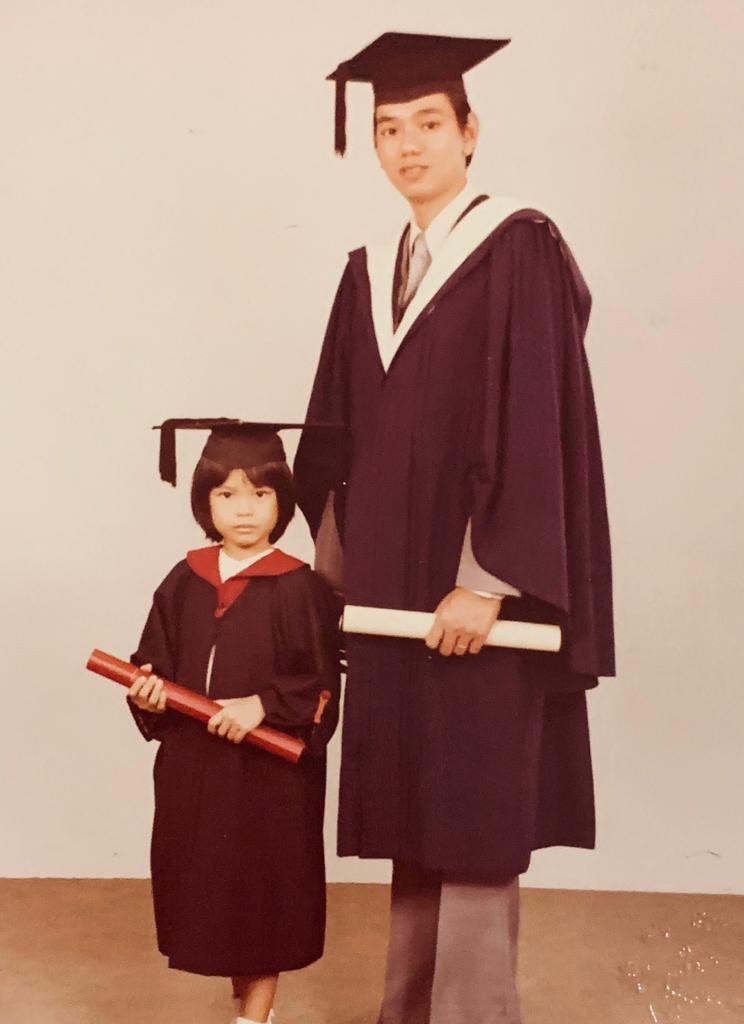 Yuen's graduation photo with his daughter who just graduated from kindergarten. Photo courtesy of Francis Yuen Kin Pheng.
Yuen's graduation photo with his daughter who just graduated from kindergarten. Photo courtesy of Francis Yuen Kin Pheng.
From there things moved pretty quickly: Yuen was fast-tracked on the leadership path, completing his Master's degree at NUS (where he did his Bachelor degree), and back overseas to the Air Command and Staff College in Alabama, U.S. for almost a year — which, incidentally, he notes with bemusement, also happens to be where the late Muammar al-Gaddafi trained too.
He returned to leadership roles at the Air Force Systems Command, where he says "a lot of my seniors became my subordinates", and he had to learn very quickly how to gain their respect with humility.
His last-held position was Head of Manpower, but Yuen says he never wanted to have "just one career" in his life, so he moved on and left the RSAF after his bond was up.
Not before some meaningful experiences, though:
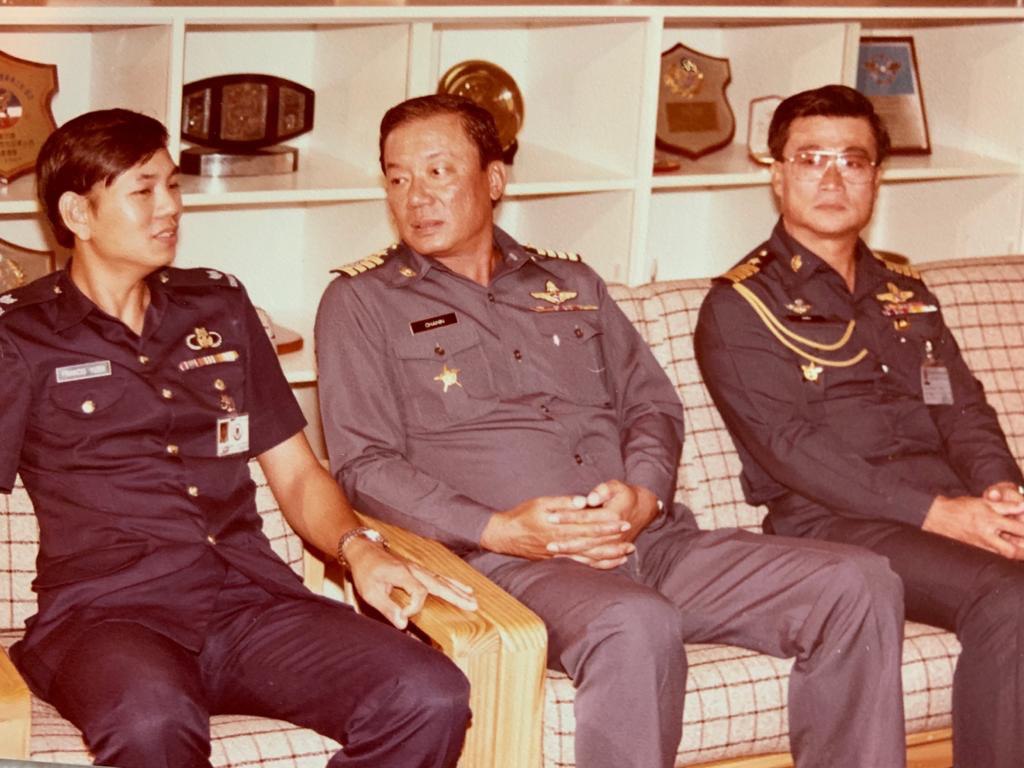 Yuen meeting other foreign military leaders during his stint at Airforce HQ. Photo courtesy of Francis Yuen Kin Pheng.
Yuen meeting other foreign military leaders during his stint at Airforce HQ. Photo courtesy of Francis Yuen Kin Pheng.
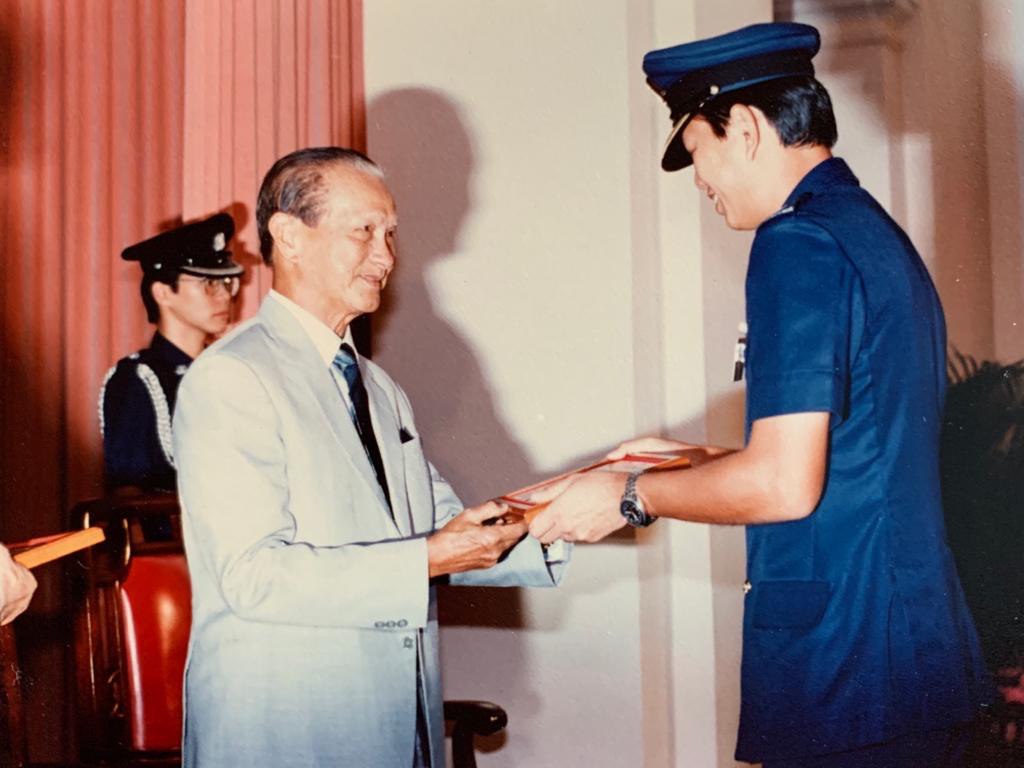 Receiving an award from late former President Wee Kim Wee. Photo courtesy of Francis Yuen Kin Pheng.
Receiving an award from late former President Wee Kim Wee. Photo courtesy of Francis Yuen Kin Pheng.
And then he went to China
On a leap of faith, Yuen accepted a job offer with an American aerospace company called AlliedSignal in 1994, which would later merge with Honeywell, also in the same sector.
The catch: it involved uprooting to Beijing and Shanghai, in China.
At the time, Yuen was at ST Aerospace, where he focused on challenging himself with the corporate side of things instead of its military arm, which would have been his comfort zone.
"I went from a big company office in Singapore to a humble office in China with few staff... (and) back then, the whole of China only had three airlines and less than 170 planes. Japan alone had 172."
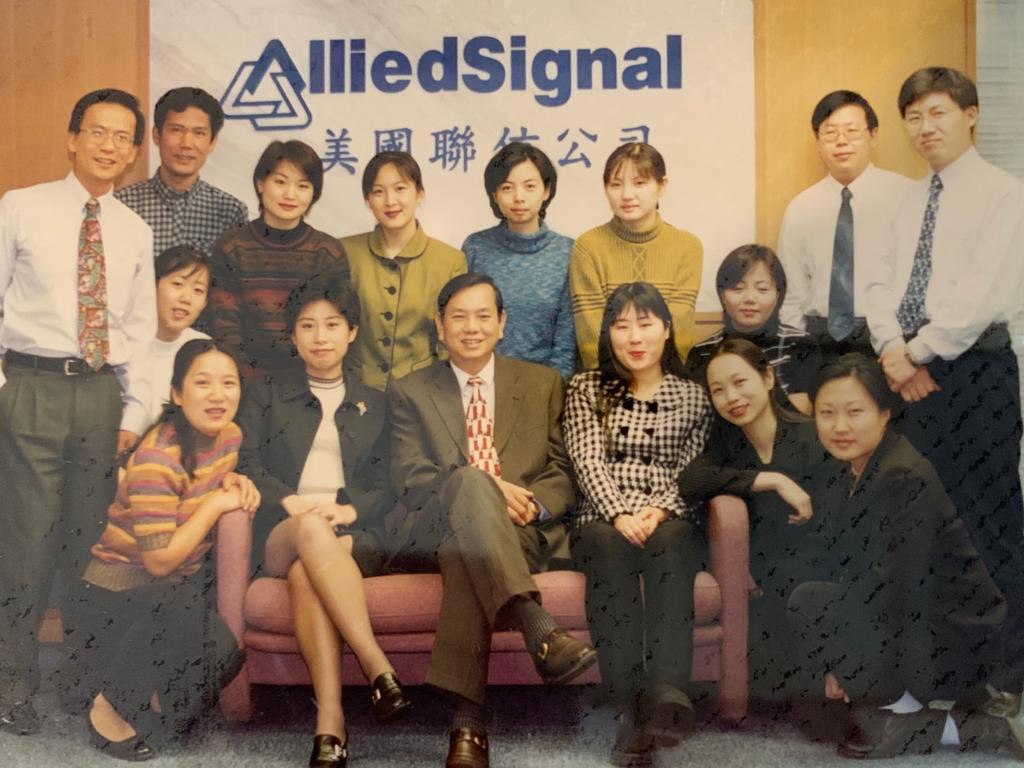 Yuen and his colleagues at his first AlliedSignal office in Beijing. Photo courtesy of Francis Yuen Kin Pheng.
Yuen and his colleagues at his first AlliedSignal office in Beijing. Photo courtesy of Francis Yuen Kin Pheng.
How to build up China's massive growth potential in aviation?
Yuen's strategy was to take on Chinese companies to manufacture for U.S. supply chains, in order to build up and expand China's capacity.
And so it was that Yuen cut his teeth in industry expansion in China in the 1990s through the noughties, where he worked in both aerospace and air-conditioning.
At various points he was in charge of company operations from India to New Zealand, Korea, Japan and even Guam.
On young S'poreans: our competitive advantage against overseas counterparts "is eroding very quickly"
But his biggest takeaways that prevail till today?
The differing mindsets of the young jobseekers and workers Yuen met and interacted with in all these countries.
"Our competitive advantage against them is eroding very quickly unless we do something to our younger generations. Make them competitive. Because I’ve been to China, looking at Chinese, looking at people from Hong Kong, looking at Taiwanese, looking at Singaporeans and everybody else, they are a very different breed from 1994 to what you see today.
If I ask a Chinese, his first question is not how much I get paid. His first question was what kind of training will I get, what else will I do. They are worried about career development more than anything else.
You look at a Hong Kong youngster, my friend was just complaining to me, he was running a business there, he asked a Hong Kong kid who wants employment, the Hong Kong kid gives him a condition that 'can I have a four-day week'. They want lifestyle, more important than pay. Different perspectives.
Now you tell me what Singaporean kid will ask, you know probably better than me. Will they ask these two questions? I don’t think so.
So basically it's a very different ballgame.
China has changed a lot, you know, not from the physical side, but from the people's mindset, their mentality, the pride in their country, the nationalistic feeling, the fervour and everything."
This, interestingly, is one of the reasons propelling him into politics — the overriding concern about our future generations of young Singaporeans entering the local and international workforce in competition against foreigners in an increasingly-globalised world, even as the Covid-19 crisis forced this a step back:
"... today’s Singaporeans, not your generation, your children’s generation will be pitting against mainland Chinese who are very smart, competitive, hungry and who are prepared to take hardship."
So why politics? And why PSP?
Which brings us back to our top two questions — he doesn't articulate this specifically to us, but Yuen appears to be doing all this because he is seized by an overall keenness to share what he has benefited from in his life and learning with young Singaporeans interested to have a stake in the country.
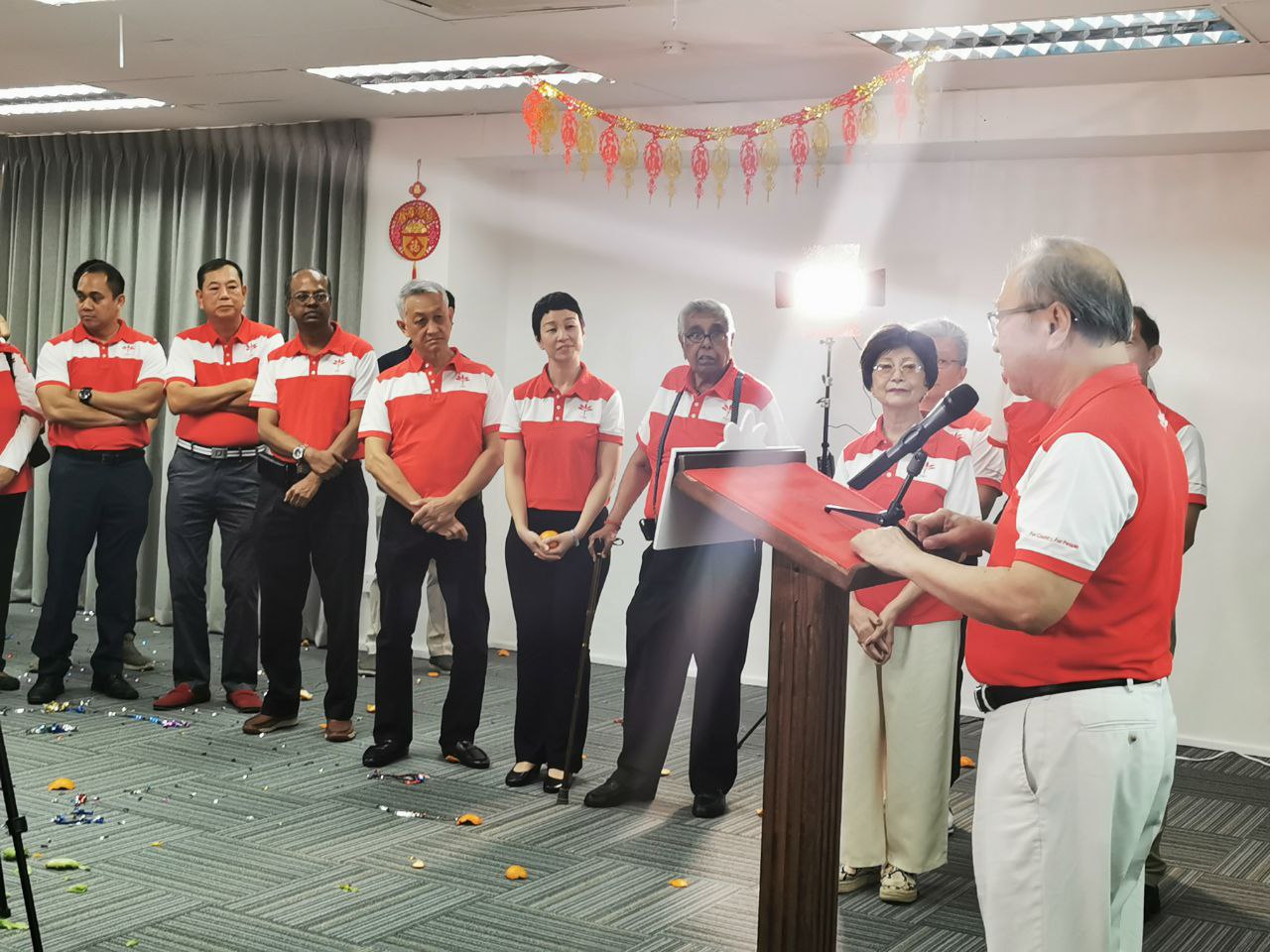 Some of PSP's members in this file photo from PSP Chinese New Year Open House by Zheng Zhangxin.
Some of PSP's members in this file photo from PSP Chinese New Year Open House by Zheng Zhangxin.
Does he think he is contributing to the notion that the party is an elderly one?
"I'm still young, you know... age is a number, you just have to believe you are young at heart," he quips, noting how he doesn't break a sweat from a two-hour stage gig with his recreational cover band Wild Ginger (he plays guitar and sings with them).
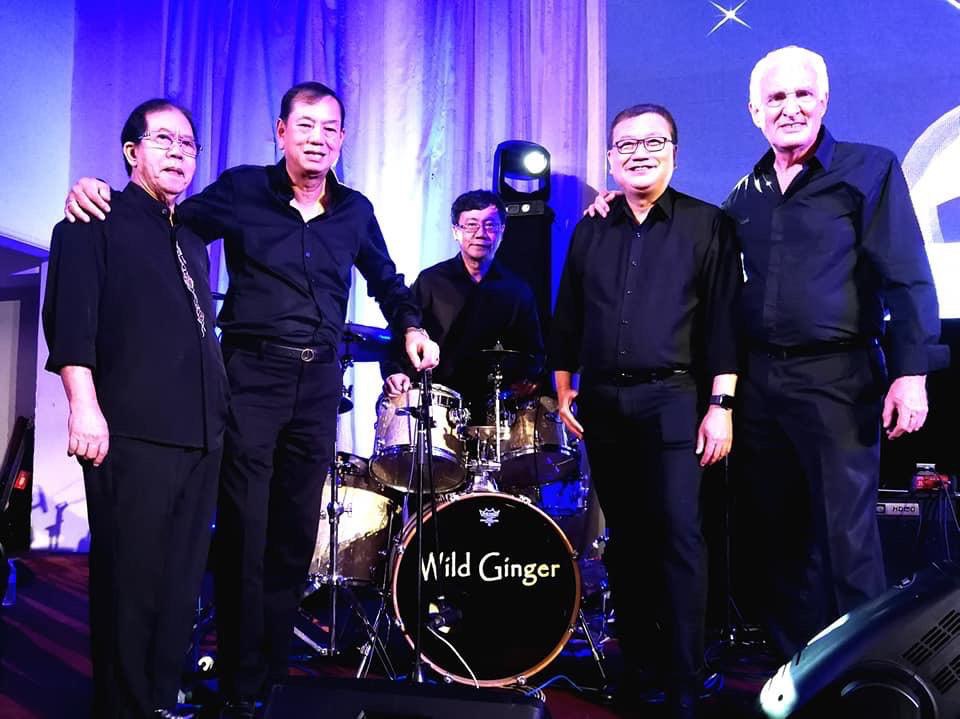 Yuen and his band called Wild Ginger. Photo courtesy of Francis Yuen Kin Pheng.
Yuen and his band called Wild Ginger. Photo courtesy of Francis Yuen Kin Pheng.
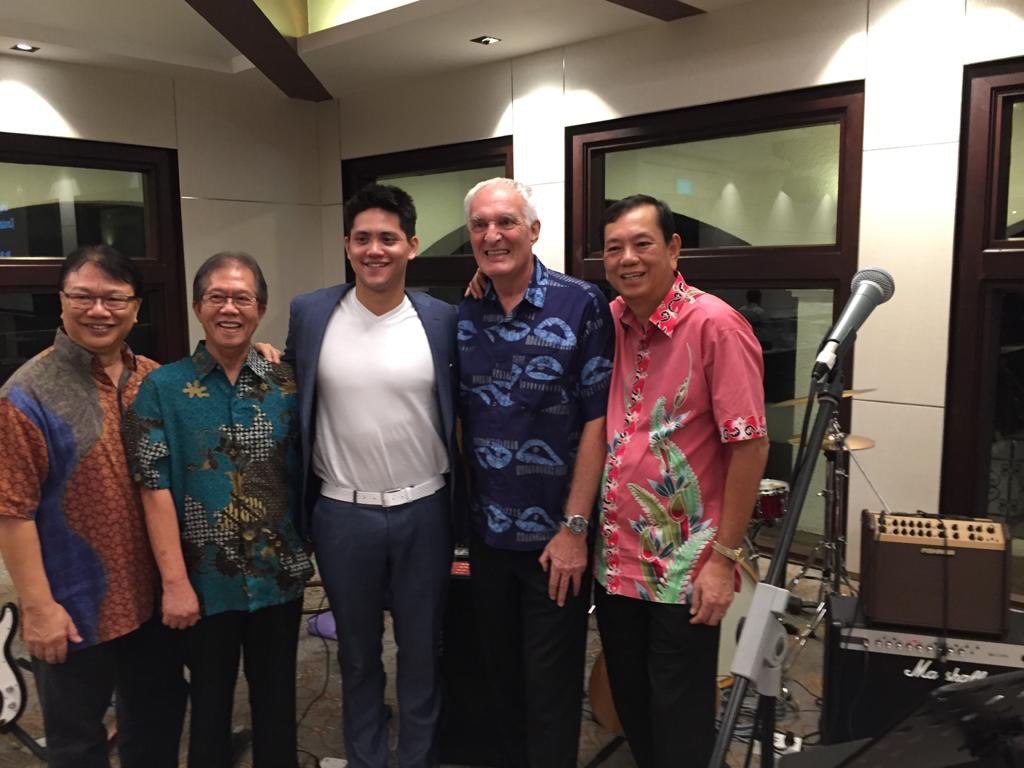 Wild Ginger at a fund raising event related to swimming, with this photo taken with Joseph Schooling when the latter just came back with his Olympic Gold. Photo courtesy of Francis Yuen Kin Pheng.
Wild Ginger at a fund raising event related to swimming, with this photo taken with Joseph Schooling when the latter just came back with his Olympic Gold. Photo courtesy of Francis Yuen Kin Pheng.
He eagerly expands on a wide range of topics, issues and concerns he is occupied with and would like to champion if he has the chance to in Parliament, ranging from SMEs to social welfare to the government's usage of the country's reserves.
Why the PSP?
Quite simple, really — Yuen says he was present at one of the party's August 2019 launches and was moved into action by party chief Tan Cheng Bock's speech at the event.
In terms of objectives, we must admit Yuen's and the PSP's do sound quite similar to what we've heard in the past from the Workers' Party (WP) — the PSP does not want to be a "complaining party", instead hoping to speak up on alternatives, and being constructive on things the government may not be "doing right".
We asked if from his perspective, the WP MPs and NCMPs currently aren't going far enough in providing the "check and balance" the PSP is also looking for to the ruling party — Yuen says their limitation lies in their small numbers that don't offer sufficient clout to the issues they have championed or spoken up about.
"So I believe they try, but I believe that [efforts will find much more effect] if not only Workers' Party but other alternate voices come in to consolidate a stronger voice... the WP alone is under a great disadvantage operating in Parliament.
Collectively as the opposition, whether, you know, we think differently — the style may be different, but I think the objective are all the same... how to better run Singapore."
The sheer size of the PSP
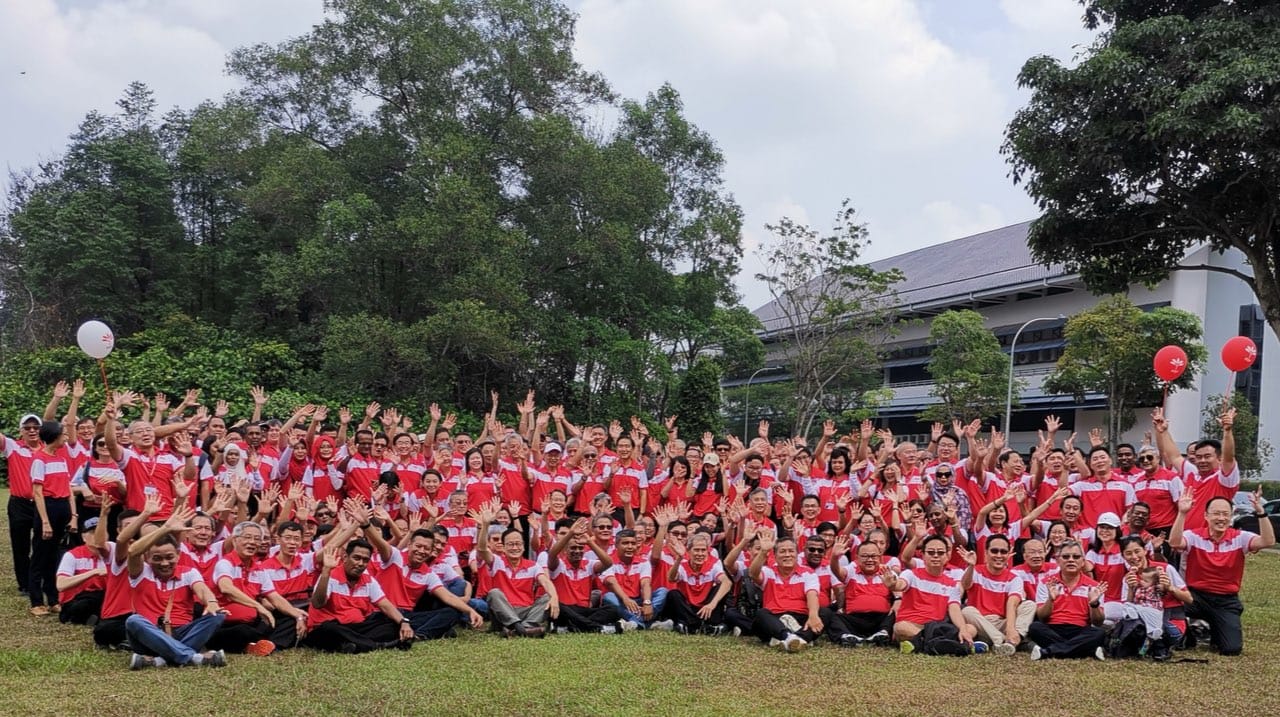 A photo of the party in late September 2019. Photo via PSP Facebook page
A photo of the party in late September 2019. Photo via PSP Facebook page
Another question we have is on the thinking behind the sheer size of the PSP — Yuen himself believes that in terms of membership, it could well be Singapore's largest at more than 1,000, second only to the PAP.
But this, interestingly — perhaps even alarmingly — is due to its policy of allowing people to join as members of the party immediately, without needing to volunteer for a time with the party first — a more typical initiation into a traditional political party, as most others do it here in Singapore.
Hit by scandals, and an exodus of high profile members
It has also seen, in recent months, a discouraging exodus of prominent members following various odd scandals that emerged within and from among key visible members — some of which sabotaged others within the party's leadership too.
Those that come to mind include the suspension of a young member named Jan Chan, who was photographed in several walkabouts and events, for an offensive post he was alleged to have put up on the NUS Atheist Society Facebook page:
An "Anonymous" video accusing several key party members of being influenced and "infiltrated by foreign proxies" was made by a member of the party's communications team, one Daniel Teo, who was subsequently expelled from the party:
In March, news came that a key young face in the party, Michelle Lee Juen, had resigned, and in May, another prominent name — Ravi Philemon — revealed he had also left, following the fallout from being implicated in the "Anonymous" video.
The two later emerged to announce they were starting a new party, Red Dot United, that has just been approved by the Registrar of Societies as a political party and looks set to contest the upcoming election.
The PSP as a startup
But Yuen views these events through an intriguingly passive-seeming lens: the businessman in him compares the PSP to a start-up — some people may have joined the party with certain aspirations, but upon learning of differences (whether in principles, values or other beliefs) or being assigned jobs they don't want, they leave.
"As long as they're not parting with bitterness," he says, it's all good — a natural phenomenon of attrition that happens in any new, large organisation. This one, in fact, he tells us, receives 10 new member applications for every member who leaves the party.
And these aren't old people applying to join — Yuen says the party's average membership age is now 45 (the slate of eight candidates unveiled on Thursday is just over 55 in comparison).
"The reason we are opening the door to people who want to join us is what Dr Tan has explained, that people who want to join us will be given a chance. We want to give people the benefit of doubt that they all genuinely want to be part of it, to be part of the party. But along the way if things don’t align with what they hope and they want to drop, it’s fine.
Having reached a stage with more than 1,000 people, I think today we are the biggest opposition in terms of membership. We don’t have volunteers."
But he does recognise the need to, exercise some amount of "quality control (our words, not his)" on who can and cannot be part of the PSP, and says the party will likely enter "a stage of consolidation" after the upcoming GE.
"Not to say that we’ll close the door. We just want to make sure that the process... the policy of widening membership to everybody, we’d actually institute a bit more steps to the process to ensure that we’ve gotten a strong core of members and a strong core of volunteers because we should also consider the process whereby people come in first as a volunteer before they become a member. Right now they can be a member straightaway."
That said, he stresses that the party is "prepared to change", and is not afraid to make changes when they think things "have not worked well" for them.
Asking "too many questions"?
It is in this spirit he takes comments from Lee and Ravi about why they left the party — one reason being that they may have "asked too many questions".
Here's what he has to say about that:
"I think questions being asked is good, especially when it comes from a viewpoint of being constructive to improve the party.
If they (Lee and Ravi) feel that then they should be more specific. What kind of questions have they been asking?
I believe in being direct... (you) don’t have to be indirect and cause people to wonder. For me as a management, a senior business leader, I’ve never used this, this is not my leadership style. I believe in calling a spade a spade."
Yuen's ultimate goal: eliminating fear
And it is this that segues into his ultimate goal of being with the party — eliminating fear of being part of the opposition, or in joining politics.
As someone who knows, and is even friends, with people in high places among the establishment (think Ho Ching, senior ministers past and present, senior civil servants retired and current, and so on), Yuen says he has heard neither compliments nor brickbats at his life choices thus far (in terms of joining the PSP or his candidacy with the party at his age) from any of these individuals.
"But I hope to believe that people are all mature enough because we should live in a society where we may have different political views but as friends, we are still friends, we should not let that affect friendships. Hopefully, we are now grown up enough to look at that."
He sees his presence in the PSP as his effort to lend credibility to the party, as a mentor to younger, emerging members who could form the party's next-generation leadership, encouraging them to be brave and stand tall as members of the political opposition, and to contribute credibly to Singapore's political discourse.
"So, I only wish that this country that we have, moving forward, is one where the atmosphere is 'Yes, go ahead. Join a political party we believe in, come out to contest your ideas, best man wins', because the best man who wins it is going to help the country and not the party, doesn't matter, you know, and that is where I'm coming from.
Everybody is concentrated on one (party) and that is groupthink. Then we will have a big problem. And, I mean, I want to emphasise, I may not live to see the day when these changes take place, but I think we must start the process, and be an agent of change."
We hope he does.
Top photos courtesy of Francis Yuen Kin Pheng, via PSP website
If you like what you read, follow us on Facebook, Instagram, Twitter and Telegram to get the latest updates.
